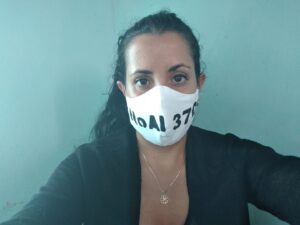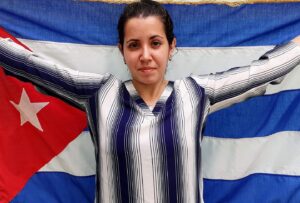Between March and October of this year, Camila Acosta –an independent Cuban journalist and correspondent for the site CubaNet– has had to move 10 times, replace her cell phone three times and has been detained up to four times.

Journalist Camila Acosta wearing a face mask that says 'No al 370' in protest of the decree. (Courtesy)
“The line that they have followed with me is to break my phones, because they know that this is the main weapon that we [journalists] have against them. And it is damaging, because every time they break your phone you have to buy another, and another and another," Acosta told LatAm Journalism Review (LJR).
On Oct. 31, Acosta was detained while covering the protest of Cuban scientist Óscar Casanella, who took to the streets with banners demanding economic freedoms for the Cuban people and calling for the closure of stores that sell in dollars for being discriminatory.
Casanella and Acosta were detained by the police, according to the journalist, and she was taken to two police stations in the course of the afternoon.
“They had me for several hours. They took, of course, my phone, my purse. At no point did they talk to me or anything, not even security. They don't even talk to me anymore,” Acosta said. “I suppose it is because every time they talk to me, well I write about it, I denounce it and I also ridicule them in some way, because they say everything, every outrageous thing, total stupidity that for this 21st century, you say, 'how are there people who still think that way?'”
After she was released, the police told her without any court order that she could not leave her house, and threatened to detain her again, saying "behave yourself," Acosta said. Her phone was returned completely wet. "It doesn't work at all," the journalist said.
When she was detained on Aug. 1, they also returned her phone, but it was broken. On that occasion, Acosta, who was not covering any news, was intercepted on the street by the police. They asked for her identity document and at the police station they checked her purse, where she had 19 masks printed with the words "No al 370" (No to 370).
Decree Law 370, which penalizes the opinions of Cubans published on social networks and digital platforms, has been in force since 2019.
They gave her a fine of 60 pesos for committing the crime of “reception”. “As there were 19 masks, here in Cuba there is a crime called reception. That is, if you have more items than you need, then they already consider that you are going to resell those items and that is a crime, but they had neither a complaint nor any proof, nothing,” Acosta said. In that detention, as she tells it, they also kept the money that she carried in her purse, a flash drive, among other things.
During the detention, they also asked her to undress for a general inspection.
"I already have several accusations against me, also false, of course, because they have not even presented evidence, but it is part of this criminal record that they already told me they were going to assemble to take me to prison," Acosta said. In Cuba, she added, the police take you to prison for a common crime, so "supposedly there are no political prisoners."

Camila Acosta with the Cuban flag. (Courtesy)
The police are tracking her, so he has to move to a new place in the next few days. "I have my things in three different places in Havana, because I have a lot, and every time I'm going to move, I can't be renting a truck and moving everything," Acosta said.
One of Acosta's main coverage topics is human rights violations, and since the pandemic began, she has covered everything related to the coronavirus on the island. "I also do interviews, I cover issues of political prisoners, the housing situation, the collapses here in Havana," she said.
At the end of March, Acosta was detained for posting news about the pandemic in Cuba on her Facebook profile. The police accused her of violating Decree Law 370, for disseminating information contrary to social interest, morals, good customs and the integrity of people on public data transmission networks, as published by CubaNet.
For this reason, they fined her 3,000 Cuban pesos, about US $120, for violating article 68 of Decree Law 370, according to Acosta. In addition, they accused her of violation of domicile for living in Havana illegally, since she is a native of another city.
Acosta maintained that, in protest, she will not pay the fine that was imposed six months ago for violating the decree.
The fine for violating the decree doubles after 60 days. If it’s not paid, the offender can go to jail.
An investigation by the Institute for War and Peace Reporting (IWPR) on complaints from the independent press and on social networks, determined that as of the end of June of this year, at least 28 Cubans, especially journalists and activists, reported having been fined through Decree Law 370 for their publications on Facebook.
"That is the other danger I have right now, and if after two months, after 60 days, you do not pay it, then they take you to court and can sentence you to up to six months of deprivation of liberty," Acosta said. “It is a threat that I have there, that at any moment they can take that as an excuse because I said that I was not going to pay the fine, and this is part of the campaign that we have carried out against 370, so several of us have said that we are not going to pay that fine.”
Acosta, 27, was born on Isla de a Juventud, in western Cuba. She graduated as a journalist in 2016 and worked for a little more than a year in the official outlet Canal La Habana. After she left the government channel, she began to collaborate with independent media such as El Toque, Periodismo de Barrio, OnCuba.
Since August 2019, she has been a reporter for CubaNet, a veteran news site about Cuba, critical of the government, based in Miami, United States.
Roberto Hechevarría, editor-in-chief of CubaNet, told LJR that in addition to Acosta, Enrique Díaz, another reporter for the website, has also been frequently harassed and detained.
Hechevarría also commented that Roberto Quiñones, another CubaNet journalist, spent a year in prison for trying to cover the trial of two pastors who wanted to educate their children at home, in April 2019. “He was released in September 2020. After being freed, he has denounced that the regime is blocking his Internet connection,” Hechevarría said.
The way CubaNet supports its journalists in Cuba, according to Hechevarría, is by financially helping the families of journalists who are taken to prison, and by replacing their equipment and work tools when they are confiscated by the authorities.
In Cuba, journalists who do not work for a government outlet are not recognized as journalists by their country. Many of them are ‘regulated,’ that is, prevented from leaving the country, and in some cases it is also difficult for them to move within the island. Acosta, like many of her colleagues in Cuba, has been regulated for a year.
Independent journalists in Cuba are constantly under siege by the authorities for carrying out their work, for reporting on what is happening on the island. Arbitrary detentions in the streets, at home, the confiscation of their work equipment, the cutting of their mobile data and Internet at home, the harassment of their relatives, partners and friends is a constant.
Making visible and denouncing their situation on the island and abroad is one of the things that gives them some protection as independent journalists, Acosta said.
“I trust that the solution is not to turn your back on the problems, it is not to run away either. We are doing a very strong job here in Cuba, which is helping to unmask this system,” the journalist said. “That is why they have this fight against me and I will persist, as long as I can. I still have strength.”
LJR attempted to contact the Cuban Ministry of the Interior to ask about Acosta's detentions, but received no response as of publication.